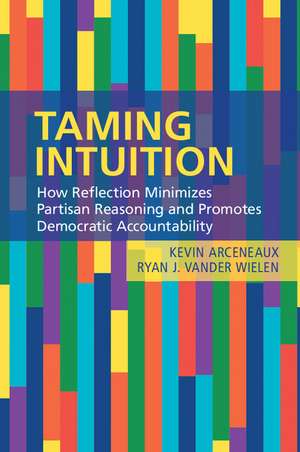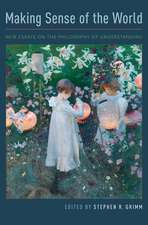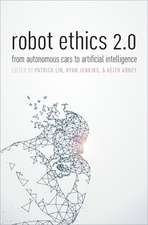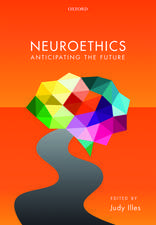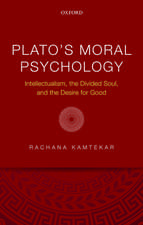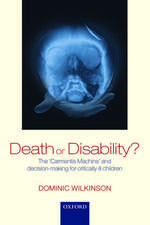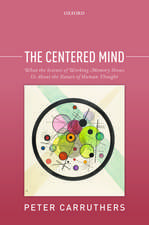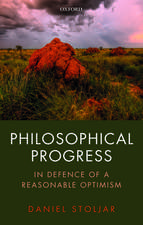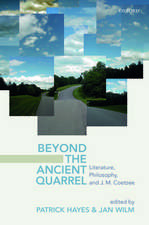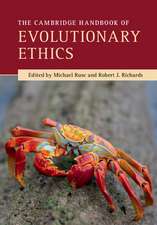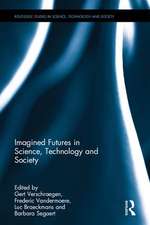Taming Intuition: How Reflection Minimizes Partisan Reasoning and Promotes Democratic Accountability
Autor Kevin Arceneaux, Ryan J. Vander Wielenen Limba Engleză Paperback – 10 aug 2017
Preț: 278.28 lei
Nou
Puncte Express: 417
Preț estimativ în valută:
53.25€ • 55.85$ • 44.33£
53.25€ • 55.85$ • 44.33£
Carte disponibilă
Livrare economică 11-25 martie
Preluare comenzi: 021 569.72.76
Specificații
ISBN-13: 9781108400312
ISBN-10: 1108400310
Pagini: 260
Ilustrații: 32 b/w illus. 27 tables
Dimensiuni: 158 x 227 x 16 mm
Greutate: 0.38 kg
Editura: Cambridge University Press
Colecția Cambridge University Press
Locul publicării:New York, United States
ISBN-10: 1108400310
Pagini: 260
Ilustrații: 32 b/w illus. 27 tables
Dimensiuni: 158 x 227 x 16 mm
Greutate: 0.38 kg
Editura: Cambridge University Press
Colecția Cambridge University Press
Locul publicării:New York, United States
Cuprins
1. Democratic accountability and the 'rational' citizen; 2. A theory of individual differences in reflection and the intuitionist model of political reasoning; 3. Measuring individual differences in reflection; 4. Toeing the line: partisan identities and policy attitudes; 5. Throwing the rascals out: partisan identities and political evaluations; 6. Can't we disagree without being disagreeable? The role of reflection in a polarized polity; 7. Reflections on the role of reflection in democracies; Appendix. Details of empirical studies and statistical analyses;
Recenzii
'Arceneaux and Vander Wielen's book is transformative as it explores a question that has been ignored when it comes to democratic citizenship: what happens when citizens reflect? They develop an impressive theory and use state-of-the-art methods to show that reflection fundamentally alters how citizens reason and make decisions. The book not only alters common understandings of citizens' behaviors, but also sets an agenda for the future of all research on democratic citizenship.' James N. Druckman, Payson S. Wild Professor of Political Science, Northwestern University
'In this remarkable book, Arceneaux and Vander Wielen apply dual-process models of how people think to questions of how they reason about politics. They develop and refine a powerful conceptual model and then provide insightful, innovative empirical tests. I have long been looking for a book like this one that integrates recent insights about human cognition with long-standing questions about how voters think. This ambitious, thought-provoking research should be read by anyone who wants to understand the role of intuition and reflection in voter decision-making.' Daniel Hopkins, University of Pennsylvania
'This book takes on one of the most important political questions of our time. Its central argument, and the evidence presented in support of it, is exciting and provocative. To date, no one has figured out how to reduce the myriad information-processing biases identified by Motivated Reasoning Theory that produce the polarization and lack of compromise plaguing our current politics. Unfortunately, giving people new and credible information in particular, and even education in general, often exacerbates these biases. The more subtle answer offered by Arceneaux and Vander Wielen is that those with the ability to coolly reflect on controversial topics can avoid making these common mistakes. Now if we can only figure out how to train people to hold such a rare combination of curiosity and cool-headedness! Taming Intuition will, at the very least, be an important voice in an important debate.' Nicholas Valentino, University of Michigan
'In this remarkable book, Arceneaux and Vander Wielen apply dual-process models of how people think to questions of how they reason about politics. They develop and refine a powerful conceptual model and then provide insightful, innovative empirical tests. I have long been looking for a book like this one that integrates recent insights about human cognition with long-standing questions about how voters think. This ambitious, thought-provoking research should be read by anyone who wants to understand the role of intuition and reflection in voter decision-making.' Daniel Hopkins, University of Pennsylvania
'This book takes on one of the most important political questions of our time. Its central argument, and the evidence presented in support of it, is exciting and provocative. To date, no one has figured out how to reduce the myriad information-processing biases identified by Motivated Reasoning Theory that produce the polarization and lack of compromise plaguing our current politics. Unfortunately, giving people new and credible information in particular, and even education in general, often exacerbates these biases. The more subtle answer offered by Arceneaux and Vander Wielen is that those with the ability to coolly reflect on controversial topics can avoid making these common mistakes. Now if we can only figure out how to train people to hold such a rare combination of curiosity and cool-headedness! Taming Intuition will, at the very least, be an important voice in an important debate.' Nicholas Valentino, University of Michigan
Notă biografică
Descriere
Individuals vary in their ability to reflect on and override partisan impulses, affecting their ability to rationally evaluate politicians.
